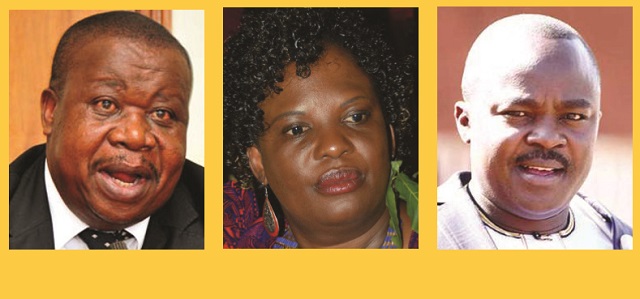
Minister for Kampala Beti Kamya has an army of police officers surrounding her home reportedly because of the threat from Kampala traders who resent her for her role in the park-yard market give-away and eviction of street vendors.
Cabinet has responded by talking tough and condemning what it calls “the extreme cases of intolerance that are resulting into episodes of violence”.
Cabinet has also stressed that no one has a right to intimidate another person on account of his/her views. Government therefore, the statement reads, cautions all those in the habit of taking the law in their hands to stop forthwith.
“Political disagreements and contestations do not need to degenerate into violence or physical confrontations,” the statement adds.
Cabinet also directed the Police and other law enforcement agencies to firmly take action against any person alleged to be intimidating and attacking any other citizen on account of his or her divergent views.
Indeed Kyuma kya Yesu is still in detention almost a month later. He has been denied bail on two occasions.
But critics say this is an injustice. The right to bail is provided for under article 28 of the constitution. Although granting it is left to the discretion of the court, observers say the offence that Kyuma Kya Yesu committed is not so grave to deny him bail.
“That young man is being treated unjustly,” said one legislator who didn’t want to be named because he didn not want to be seen as condoning the attack on his colleague, “if murder suspects are granted bail how can you deny it to someone who merely pushed a person he disagreed with?”
Other analysts say government is addressing the wrong problem. They say what government should be addressing are the underlying causes of this anger and intolerance and not the effects.
Human Rights Lawyer Ladislus Rwakafuzi says people are behaving that way because they have been left with no other way of expressing themselves.
“People are expressing themselves the only way they think they can be heard,” Rakafuzi says, “Government is not listening to people. You can’t write your concerns in the papers and they are listened to. People feel that Government does not care.”
Rwakafuzi adds that people have been pushed to extreme behaviors. He gives an example of State Attorneys who he says have never gone on strike but have now been pushed to the limit.
“Have you ever seen State Attorneys strike?” he asks, “now even the judges want to strike. I was at CID Headquarters and the police officers were saying they can also refuse to prepare files for the prosecutors if their grievances are not addressed.”
He noted that while government thinks these are isolated incidences, they are not.
“People have resorted to extreme measures,” he said.
Former Ethics and integrity Minister Miria Matembe agrees with Rwakafuzi.
She says people have been suffocated for too long and cannot endure the injustices and the unfairness anymore.
“The unfairness is too much,” she says, “the poverty is too much, the gap between the rich and the poor is widening and yet people have no chance of protesting. That is the only way they can protest and show dissatisfaction of what they are going through.”
Makerere University Political Science Don Sabiiti Makara also blames the recent behavior on the desperation among the public. “People are desperate because of poverty and the economic hardships,” he says. “When the population is full of people who go hungry for days, they can do anything. When they feel oppressed, they can do anything especially if they feel that the institutions which are supposed to address these issues aren’t doing that.”
 The Independent Uganda: You get the Truth we Pay the Price
The Independent Uganda: You get the Truth we Pay the Price






This article reminds me of what Marie Antoinette allegedly said just before the French revolution. When told that starving French peasants lacked any bread to eat, the queen is alleged to have callously declared, “Let them eat cake!” There is no evidence, however, that Marie Antoinette ever uttered that famous quip. The short point is that she was part of the monarchy/ruling class that was so out of touch with the people that it inevitably led to the French revolution. Uganda today, it seems to me, sits on a precipice of a violent change, not because of ideological reasons but simply for survival. You cannot insidiously take away (in no particular order) peoples’ dignity, freedoms, identity and means of survival as has happened over the past 31 years and expect them them to sit back and applaud. When the scales fall from their eyes, there is no telling what they are capable of doing. BUT as there is a solution, one of which has been able put forward in the final paragraph of the article.